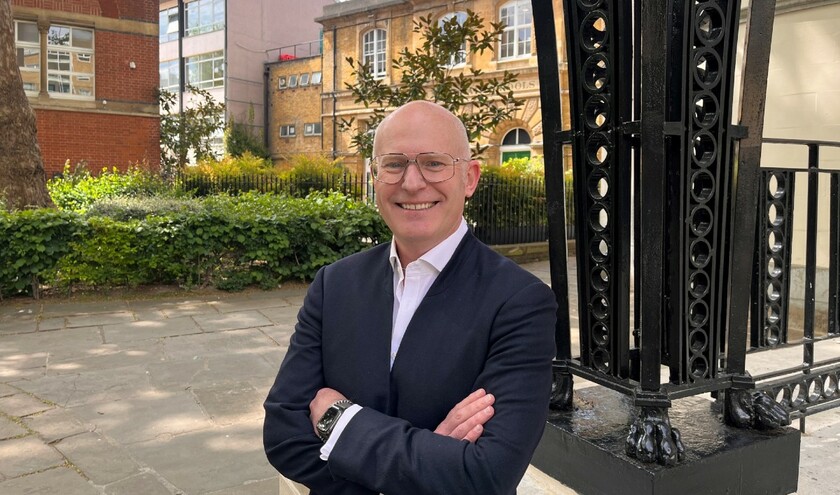The largest community trust in England, CLCH provides services to over 4m people across 14 London boroughs and Hertfordshire, including four ICS.
The trust has a workforce of around 5,200 operating across 763 service locations.
‘We have 105 service lines and see over 10,000 people a day, providing an offer from birth all the way through to end-of-life care and post end-of-life care for families,' Benson told us.
‘Technically we also do pre-birth because we've got integrated sexual health services.
‘We also have a very large school nursing service, as well as around 250 in-patient rehabilitation beds.'
Partnering with four ICS, Benson is ideally qualified to provide insight on the huge systemic reorganisation being undertaken across the NHS.
‘I think there is significant change in terms of the NHS in general and we are working with our ICBs to understand what that looks like, in terms of strategic commissioning and what the role of providers will be,' Benson said.
‘I suspect in some places in which we work we may well be an integrating organisation and in other places we will be a strong and supportive partner.'
Benson said CLCH expected to work in different models with different partners because of the size of the organisation and its varying geographies.
‘It's okay to be one thing in one area and not in the other because otherwise you don't believe in partnership,' he observed.
The chief executive said he expected changes at ICBs to have both a positive and a negative component.
‘As a provider that has been more used to working with ICBs in terms of commissioning arrangements and contracting, we are expecting changes,' Benson said.
‘As a community provider, given what the Government has been saying about the shift to community, we are expecting change there too.'
Community shift
The chief executive said he was ‘excited' about the Government's drive to shift the NHS from hospital to community care.
‘There is a real opportunity for us to think what is the right thing for our residents?' Benson observed.
He highlighted several key important points regarding the shift.
‘The first is the delivery of a core offer that is not about everyone having the same but getting ourselves into a position where we are able to describe for our residents the sort of services they can expect to get,' he said.
‘How we tailor those to the needs of our populations is different but I would argue that our residents are more similar than they are different and we should be able to describe to them what an offer to them looks like.
‘It's then you make it bespoke depending upon the populations you serve.'
Integrated neighbourhood working
The next component highlighted by Benson was how to work in an integrated way with partners and what that means for integrated neighbourhood working.
‘I think we've a very different offer in that space and we're working in very different ways, depending upon the areas in which we work,' he said.
Benson said the most important aspect in this area was strengthening CLCH's relationship with other primary care partners, including GPs, in partnership with local government, particularly in terms of addressing the wider determinants of health.
‘If we see just the health component, we're really not going to maximise the benefits we can deliver,' he observed.
‘A quarter of our business is directly commissioned universal services, therefore, our relationship with local government is very different.'
The chief executive said reorganisation was a real opportunity for community service providers to strengthen relationships with primary care partners and local government at the same time and to work in an integrated way within neighbourhoods.
‘Neighbourhood working is about geographies in which people live and work,' Benson noted.
‘That means we need to bring to the fore all the skills of all the partners in that space.'
When asked what form a neighbourhood healthcare model should take, Benson identified a population of 30-50,000, adding this was dependent on the type of geography whether that be metropolitan, county or district.
‘For me, it's about how we build enough focus on the delivery of a neighbourhood healthcare service to understand how services are operationally delivered,' he said.
‘How do they work in partnership together and what are the outcomes they are achieving about health delivery, health and healthcare and the predictive nature of that?
‘What I want to see is not just a conversation about organisational structures but about what we are doing in terms of improving the health of the population, the productivity of our offer and switching into a proper preventative model.'
The chief executive said he was not concerned about moves towards merged ICBs counteracting the drive to neighbourhood care.
‘We have to be clear that neighbourhoods don't exist by themselves,' he said.
‘Our residents in North Westminster, North Kensington and Chelsea are a diverse population but they don't sit in isolation from residents in south Brent or the south of Westminster and Chelsea.
‘If we create a model that neighbourhoods are distinct and paramount with no relationship to anything else then we'll also be doing the wrong thing. There's always this tension.'
Partnership working
The final key component of the shift to community care highlighted by Benson was the trust's relationship with the voluntary sector.
‘We have some really good examples of where we work in partnership, especially around case management and case identification, with the voluntary sector because they have a rich history and pedigree in working with communities in a very different way,' Benson said.
The trust boss said it was important to expand the community offer from just individual service lines, for example, to how providers can support people to live in a healthy way in their own environment and reduce hospital admissions.
CLCH works in a variety ways to reduce admissions for acute partners.
This includes partnering with care home providers in Barnet to maximising the use of virtual wards in Hertfordshire.
‘We have agreed with our system partners to try and reduce admissions by 25% for our older people in south and west Hertfordshire this year,' Benson revealed.
‘Services have been commissioned historically for care delivery but we need to move to commissioning for care and prevention as well,' he explained.
Benson highlighted virtual wards as a key area of incorporating care and prevention within the same model.
‘There's real potential here to support more people to stay well,' he observed.
Digital shift
The chief executive said there needed to be ‘significant change' in the digital maturity of the sector to back up the shift to community healthcare.
‘There have been funding issues for community services and I see this as a real opportunity to turn this around,' he noted.
Priorities in this area identified by Benson include a ‘proper, effective and useful' EPR.
‘I suspect EPRs are not where I need them to be at the moment and not as intuitive as I think they need to be moving forward and I'm really keen to work with suppliers in that space,' he said.
The second area identified by the trust boss was maximising technologies for residents.
‘We have a really significant history in the use of technology to support people at home but we need to expand that in terms of new types of technology that we might be able to deploy, especially around self monitoring and rapid point of care testing,' Benson said.
The third component highlighted by Benson was using digital technology to enable people to access care when they need it most.
‘This is where the real partnership aspect comes in which is what does that actually mean for our relationship with our primary care services – dental, pharmacy and GPs and how we maximise the use of self directed care?' he said.
Healthcare inequalities
With addressing inequalities in healthcare outcomes likely to be another key theme in the 10-Year Health Plan, Benson said the important factor was enabling equal access for people in the bottom quintiles.
‘We need to make sure that we're delivering services at a time when we know people can access them and we are supporting them to get those services,' he said.
Reasons for optimism
Looking ahead, Benson said NHS reorganisation could deliver closer and more consistent working.
‘The NHS is very used to change,' he noted. ‘I think this is about making sure that we are really focusing what we are trying to deliver to our residents.
‘For me it is about understanding what it means in terms of working with our many different partners.'
Benson said the 10-Year Health Plan would need to address the 30% reduction in proportional spend on community services and provide clarity around how capital investment will work and what that means in terms of partnership working with primary and community providers not in the hospital space.
The chief executive also called for a consistent vision in terms of what community services offer to end the postcode lottery of provision.
‘We must move from just delivering services to a much richer understanding of the health of our population and therefore delivering and potentially commissioning services with other partners for the delivery of more integrated health and care,' Benson said.
The health boss concluded by stressing delivering the shift to community healthcare will only be achieved through a clear understanding of its productivity, cost-benefit analysis and impact, adding this will require a change of funding model from single, bloc contracts.
If you would like to appear in The Big Interview email Lee Peart at l.peart@hgluk.com



